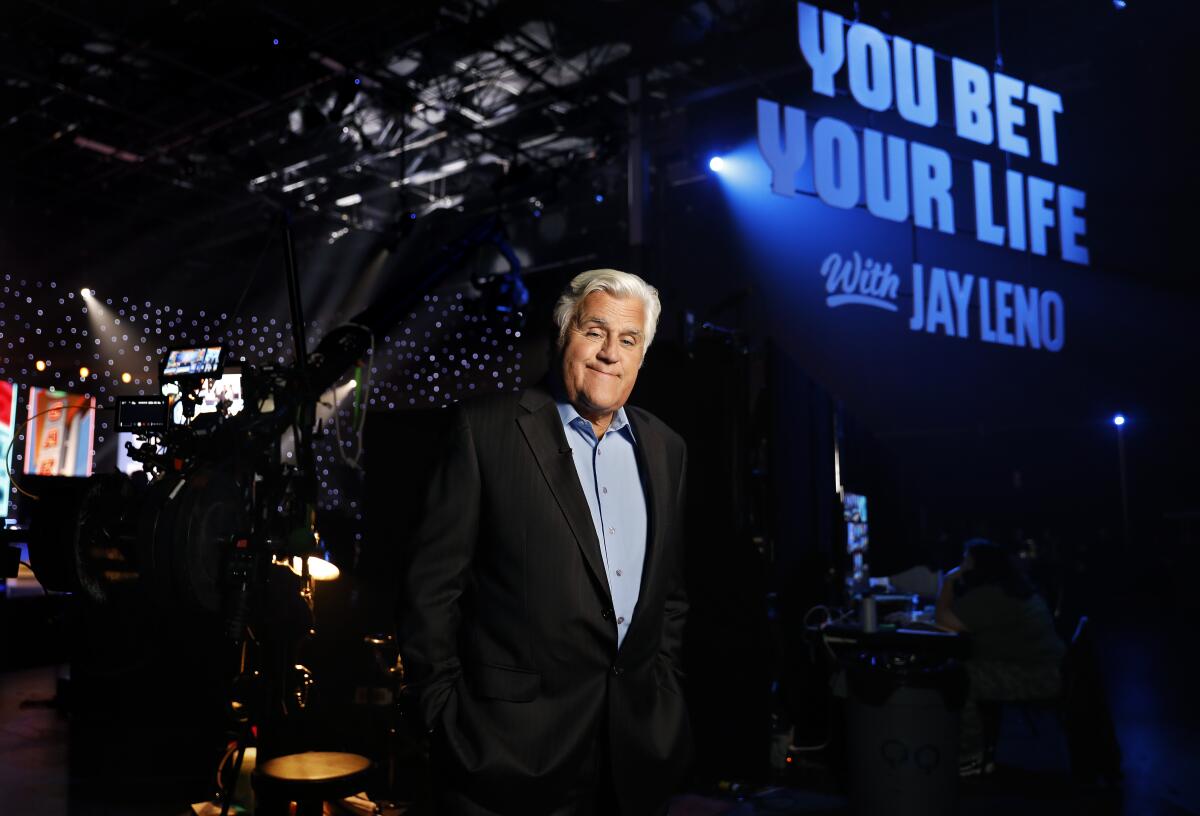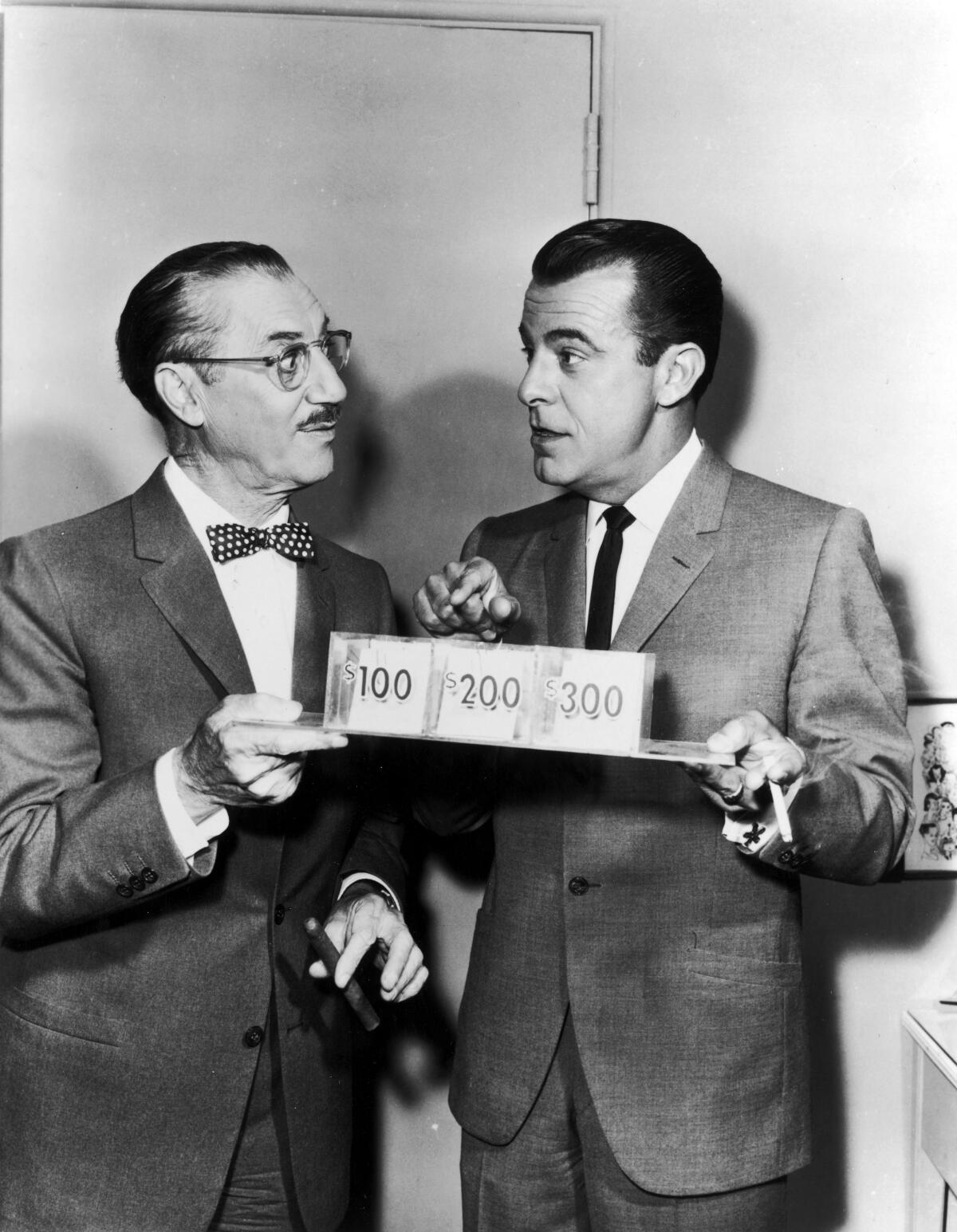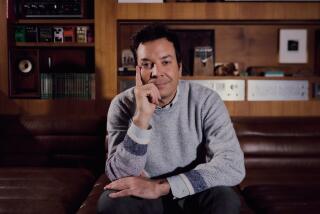Jay Leno revives game show ‘You Bet Your Life.’ Will it work?

There are not many questions Jay Leno can’t answer with a joke.
Are there any health protocols when he plays a comedy club? (“Wear a condom.”) Is he vaccinated? (“I got the Pfizer with Moderna drizzle on it and a chocolate almond biscotti — that’s how they do it in Beverly Hills.”) Is there humor to be mined from the coronavirus pandemic? (“A lot of mom-and-pop restaurants went under. Here’s how bad it is — I saw a Mafia don getting dinner to go at an Olive Garden.”).
Leno, 71, remains a gag machine seven years after leaving NBC’s late-night franchise “The Tonight Show,” where he was host for 22 years and No. 1 in the ratings for most of them.
The indefatigable stand-up comic will have a new daily outlet to practice his craft starting Sept. 13 when he fronts an updated version of the classic game show “You Bet Your Life,” nationally syndicated by Fox First Run, a division of Fox Television Stations. (The show will air on KTTV in Los Angeles.)
The show’s return comes during a major revival for game shows in recent years. Broadcast TV has been turning to the genre with greater frequency as a cost-effective, low-risk alternative to the expensive scripted programs that viewers now are more likely to seek out on streaming services.
Since 2016, ABC alone has brought back “Press Your Luck,” “$100,000 Pyramid,” “Match Game,” “To Tell The Truth” and a celebrity edition of “The Dating Game.” The network soon will add special editions of “Jeopardy!” to its prime-time lineup.
Stephen Brown, executive vice president for programming and development at Fox Television Stations, said the breezy entertainment that game shows provide makes them an escapist sanctuary in the current TV landscape.
“Streaming programs tend to be a little darker and edgy,” Brown said. “Game shows are people winning money. They are usually brighter and lighter. They are feel-good experiences. I think America in particular craves that right now.”
In the years since Leno left his late-night perch, many veteran comedians say their business has become more challenging, with the fear of “cancel culture” constricting their creative freedom.
But Leno is not among the complainers, having always taken a service-oriented approach to his work.
‘When I do a gig in Utah and they’ll go, ‘Look, we don’t want any drug jokes, we don’t want any sex jokes,’” Leno said during a recent Zoom call from his Los Angeles home, “I go, ‘OK, I’ll take those out’ and I do something else. With the #MeToo movement, all of a sudden the sexist jokes everybody used to do, you can’t do anymore. So you either change with the times or you die. You adapt to the circumstances.”
In March, Leno apologized to the Asian American community for the many gags he’s made about Koreans eating dogs. His penchant for the jokes drew him into a controversy at NBC’s reality competition series “America’s Got Talent,” where one of the judges, Gabrielle Union, complained of a toxic work environment and racist behavior that was investigated by the company in 2019. Among her issues was a dog-eating joke made by Leno that was cut from the program.
Leno said he is willing to own up to his mistakes.
“If I see somebody who’s really hurt by something I did, that’s not my job,” he said. “The idea is to get them to laugh.”
But it did take a while to get that apology. Guy Aoki, founding president of the Media Action Network for Asian Americans, had been after Leno to drop such jokes from his act for years. The demands became more intense over the past year as former President Donald Trump’s description of COVID-19 as “the China virus” instigated hatred and even violence against the Asian American community.
Aoki told The Times that he wrote a letter to “You Bet Your Life” producers Tom Werner and David Hurwitz, saying his organization would launch a boycott of the show’s advertisers unless Leno was fired.
Aoki was satisfied after Leno called him directly to address the matter, leading to an unequivocally contrite statement in which the comedian said he knew the jokes were wrong.
“After the Zoom meeting, Jay called me back and said, ‘I want to do whatever I can to get back the respect you once had for me,’” Aoki said in an interview. “And that meant a lot to me. And then he ended up calling me back 20 times. We had a lot of time to talk about stuff.”
Leno listened to Aoki, a Japanese American, explain how during his college years, the door of his dormitory room would be defaced on the anniversary of the Pearl Harbor bombing.
“He was fighting back tears,” Leno said. “I could sense that it was a big emotional thing for him. I was moved by having a conversation with the guy and I go, ‘OK, I get that.’ I’m not trying to win an argument. I’ll never convince that guy that that joke was funny, which is my job to do.”
The discussion made Leno think of his own father’s reaction to the old TV series “The Untouchables” and its crude portrayals of Italian American organized-crime figures.
“The Italians always had their wife-beater shirt with the salami and the bottle of wine,” he said. “Everything was the Mafia and mob, and all Italians are crooks. It would just make my dad furious.”
But Leno noted the public’s response to his apology reflects the divided state of the nation.
While dining in a West Hollywood restaurant, he was warmly thanked by a group of gay men. Around the same time, a profanity-laced letter came in from a fan in Long Island, N.Y., chastising him for his statement.
The letter writer was so agitated that Leno called him.
“He goes, ‘I’m still a fan but when you said you apologized for the joke, I thought, man, you’re just being chickens—,’” Leno recalled. “I said, ‘What do you do?’ He goes, ‘I’m a teacher.’ I said, ‘What do you teach?’ He goes, ‘High school English.’ I said, ‘High school English? You sent me a letter and it’s all f— you.’ It just made me laugh.”

Leno said he has purged political humor in his act, as the polarization in the country means he loses half the audience when he pokes fun at one side.
On his version of “You Bet Your Life,” contestants with different social, cultural and ethnic backgrounds work together in answering questions for cash prizes.
“We’ll pair a rapper from Chicago with an Ohio farmer lady, and they work as a team and it’s quite funny to watch,” Leno said. “There’s no politics, there’s no Trump jokes, there’s no Biden jokes. There are jokes about Congress in that generic sort of ‘they’re idiots’ type of thing.”
The original “You Bet Your Life” was hosted by comedy film star Groucho Marx from 1950 to 1961 and was so popular that repeats of it ran for years under the title “The Best of Groucho.” (Leno will have former “Tonight” bandleader Kevin Eubanks as a sidekick, a role filled by George Fenneman on the original show.)
After taping more than 70 episodes, Brown believes “You Bet Your Life” can provide some relief from these contentious times.
“There are high fives and hugs and they are absolute strangers,” he said. “It’s a reminder of what we are. When we need to, we work together to achieve something — in this case to earn money.”
More to Read
Inside the business of entertainment
The Wide Shot brings you news, analysis and insights on everything from streaming wars to production — and what it all means for the future.
You may occasionally receive promotional content from the Los Angeles Times.











